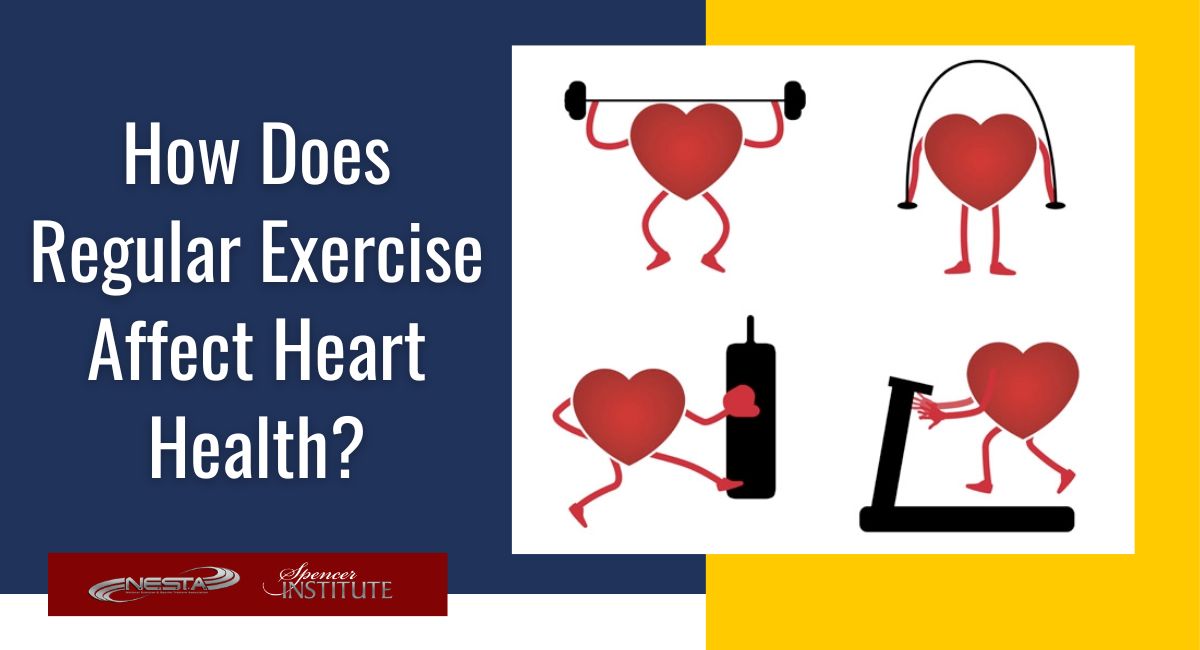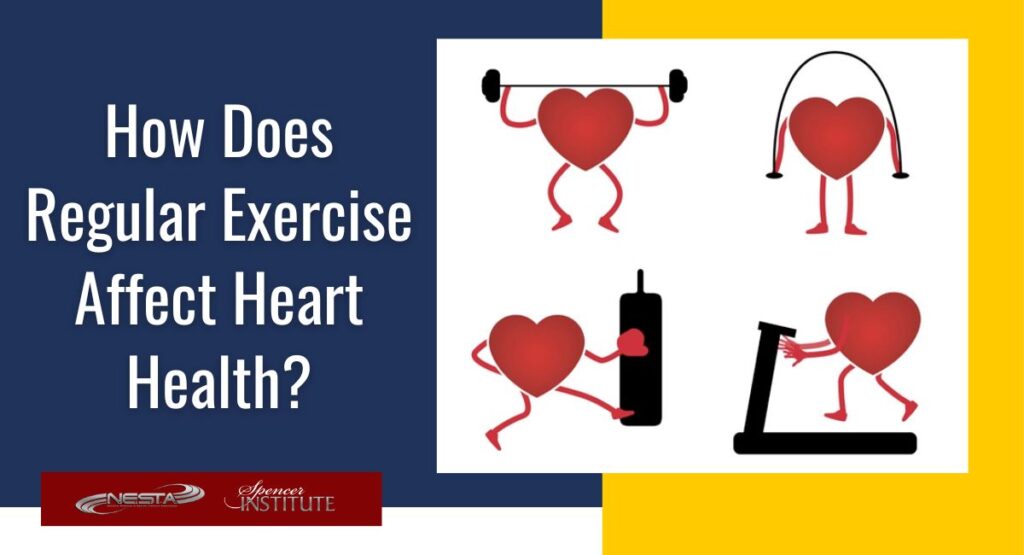 Regular exercise is one of the most effective ways to improve overall health, especially heart health. The heart is a vital organ that pumps blood and oxygen throughout the body, ensuring that all other organs function properly and efficiently. As a health and fitness professional, you know that exercise is an essential component of a healthy lifestyle, and it has been shown to have numerous benefits for the heart. We will discuss how regular exercise positively affects and benefits heart health.
Regular exercise is one of the most effective ways to improve overall health, especially heart health. The heart is a vital organ that pumps blood and oxygen throughout the body, ensuring that all other organs function properly and efficiently. As a health and fitness professional, you know that exercise is an essential component of a healthy lifestyle, and it has been shown to have numerous benefits for the heart. We will discuss how regular exercise positively affects and benefits heart health.
Exercise Helps to Lower Blood Pressure
High blood pressure is a major risk factor for heart disease. Regular exercise has been shown to help lower blood pressure in people with hypertension. When you exercise, your heart works harder to pump blood throughout the body. This helps to improve the efficiency of your cardiovascular system and can lead to a lower resting heart rate. Lower blood pressure can also reduce the risk of stroke, kidney disease, and other health problems. Here’s more detailed information about how cardiovascular exercise improves blood pressure for your client.
Exercise Reduces the Risk of Heart Disease
Heart disease is the leading cause of death in the United States. Regular exercise can help reduce the risk of developing heart disease as it will help to lower cholesterol levels, reduce inflammation, and improve blood sugar regulation. All these factors can help to reduce the risk of heart disease.
One recent study found that people who exercised regularly (3-4x/week) had a 35% lower risk of developing heart disease compared to those who did not exercise. Another study found that people who exercised for at least 30 minutes a day had a 20% lower risk of developing heart disease compared to those who did not exercise.
Exercise Improves Heart Function and HRV
Regular exercise can help to improve heart function such as a lower resting heart rate, improved heart rate variability, and ejection fraction. Ejection fraction is a measurement of the percentage of blood leaving the heart each time it squeezes. When you exercise, your heart pumps blood and oxygen to the muscles that are working. This helps to strengthen the heart muscle and improve its ability to pump blood throughout the body. Regular exercise can also improve the delivery of oxygen and nutrients to the heart, which can help to prevent heart disease.
Exercise can also help to improve heart rate variability (HRV), which is a measure of the variation in time between each heartbeat. Higher HRV is associated with better heart health and a lower risk of heart disease. Regular exercise can help to improve HRV and reduce the risk of heart disease.
These topics are taught in detail as part of the NESTA Heart Rate Performance Specialist Certification course.
Exercise Can Help to Reduce Stress
Stress is a major risk factor for heart disease. When you are stressed, your body releases hormones such as cortisol and adrenaline, both can increase blood pressure and heart rate. Chronic stress can lead to inflammation, which can damage the arteries and increase the risk of heart disease. It’s all connected.
Regular exercise can help to reduce stress and improve overall mental health. Exercises of various formats release endorphins, which are feel-good chemicals that can help to reduce stress and improve mood quickly. Exercise can also help to improve deep and restorative sleep, which can further reduce stress and improve heart health.
Exercise Can Help to Manage Weight
Maintaining a healthy and optimal weight is important for heart health. Being overweight or obese can increase the risk of high blood pressure, high cholesterol, and other risk factors for heart disease. Regular exercise can help to manage weight by burning calories and increasing your metabolism. Metabolic health is directly correlated to heart health.
Exercise can also help to build muscle mass, which can increase metabolism and help to burn more calories even when you are not exercising. This can help to prevent weight gain and maintain a healthy weight over time. There is always a lifestyle and emotional component to daily exercise and adherence to movement. These topics are discussed in detail in the NESTA Lifestyle and Weight Management Specialist Certification.
Exercise Will Improve Your Overall Quality of Life
Regular exercise can have a positive impact on overall quality of life. It will help to improve daily energy levels, reduce fatigue, and improve overall physical and mental health. It also improves clarity of thought due to better oxygenation of the brain. These are the aspects of a healthy lifestyle that you teach as a Spencer Institute Certified Health and Wellness Coach. Exercise can also help to improve self-esteem, self-talk and confidence, which can lead to a more positive outlook on life. And, since you become what you say to yourself most often, this is very important.
Improved quality of life can also lead to better adherence to other healthy lifestyle habits, such as a healthy diet and quitting smoking. All these factors can contribute to better heart health and a lower risk of heart disease.
Types of Heart Disease: What Health and Fitness Pros Should Know
Heart diseases refer to various conditions that affect the heart’s normal functioning, which may range from mild to severe. These diseases are commonly caused by a combination of factors, including genetics, daily lifestyle choices, and underlying health conditions – both small and large.
Coronary artery disease is the most common type of heart disease. It is caused by the buildup of plaque in the arteries that supply blood to the heart muscle. Over time, this can cause the arteries to narrow, making it harder for the heart to pump blood. Coronary artery disease can lead to chest pain, shortness of breath, and heart attacks.
Arrhythmia is a type of heart disease that refers to irregular heart rhythms. This condition can cause the heart to beat too fast, too slow, or in an irregular pattern. Arrhythmia can lead to symptoms such as palpitations, chest pain, and dizziness. It can also increase the risk of stroke or heart failure.
Heart failure is another common type of heart disease, which occurs when the heart muscle is weakened or damaged, making it difficult for the heart to pump blood effectively. This condition can cause symptoms such as fatigue, shortness of breath, and swelling in the legs and ankles. Heart failure can be caused by a variety of factors, including high blood pressure, coronary artery disease, and diabetes.
Valvular heart disease is a condition that affects the heart valves, which control blood flow in and out of the heart. This condition can cause the valves to narrow or leak, making it harder for the heart to pump blood effectively. Valvular heart disease can lead to symptoms such as chest pain, fatigue, and shortness of breath. It can also increase the risk of heart failure and stroke.
Cardiomyopathy is a condition that affects the heart muscle, causing it to become enlarged, thickened, or rigid. This can make it harder for the heart to pump blood effectively, leading to symptoms such as fatigue, shortness of breath, and swelling in the legs and ankles. Cardiomyopathy can be caused by a variety of factors, including genetics, infections, and alcohol abuse.
Congenital heart disease is a type of heart disease that is present at birth. This condition can affect the structure or function of the heart, leading to symptoms such as cyanosis (a bluish tint to the skin), fatigue, and shortness of breath. Congenital heart disease can be caused by a variety of factors, including genetics and environmental factors.
Here are some final thoughts: Heart diseases are a serious health concern that affects millions of people worldwide. While these conditions can be caused by a variety of factors, many can be prevented or managed with lifestyle changes, medication, and other treatments. If you have concerns about your heart health, it is important to speak with your healthcare provider to receive a proper diagnosis and treatment plan.
As a health and fitness professional, it’s important that you understand the structures of the heart, heart health and heart disease. It’s also important for you to properly educate your client on what exercise can, and cannot do, safely and effectively to improve their heart health. When there is any suspicion of any heart ailment, always refer your client to their primary care doctor or cardiologists for further evaluation.
If you are a new or experienced health, fitness, or wellness professional, and are seeking further education, click here to learn about our professional training courses.






